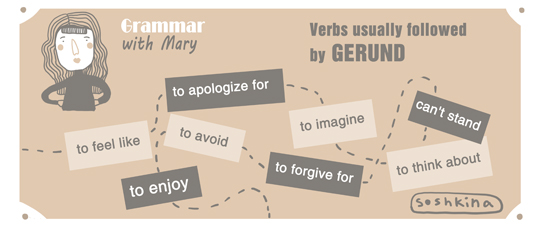Verbs Usually Followed by Gerund
- to enjoy
- to imagine
- to avoid
- can't stand
- to feel like
- to apologize for
- to forgive for
- to think about
Hi, guys!)
How was your day?
I really enjoyed drinking coffee this morning. It was so good, so hot and spicy, with cinnamon and milk.
I enjoy drinking coffee.
How many verbs do we have in this sentence?
That's right, two verbs! Enjoy and drinking.
When we have two verbs in a sentence, one after the other, we call this a verb pattern. Enjoy is the main verb. Just like any other verb we can put it in another tense, such as I enjoyed drinking, or I will enjoy drinking.
But you see, “drinking” stays the same. It doesn't change, no matter what tense we use for “enjoy”. Drinking is the gerund of the verb “to drink”. We form the gerund by adding –ing to the infinitive of the verb.
I enjoy drinking coffee.
I enjoy walking with my dog.
I enjoy writing podcasts.
What form do we use after enjoy? We use the gerund after “enjoy”!
Do you enjoy talking to your friends? Do you enjoy listening to me?
There are some things I don't enjoy doing. For example, I can't stand going to early double periods at the university. As you see, we use “going”, which is the gerund form, after “can't stand”.
I can't stand eating stewed vegetables. What about you?
I often imagine achieving my dream.
I want to write a book someday, so I often imagine holding my book in my hands and giving out autographs to fans.
As you can see, we use the gerund after the verb “imagine”.
What do you imagine yourself doing?
I had a row with a professor at the university, so now I avoid talking to that guy. I don't want to get into another argument.
What form do we use after “avoid”? Right! Gerund!
Have you ever avoided doing anything you needed to do? Why?
You know, right now I feel like taking a little break. I wanna grab a bite to eat and then I'll come back.
As you can see from this sentence, we use “taking” after “feel like”, so we use the gerund form after “feel like” in verb patterns.
What do you feel like doing right now?
Last week I promised to help my friend. But I couldn't keep my promise, so I apologized for breaking it. I apologized for not doing what I had promised to do.
So what form do we use after “apologize for”? that's right, we use the gerund.
Have you ever apologized for doing something? What had you done?
I apologized to my friend, and my friend forgave me for breaking my promise. I really love my friend, she's so nice and kind to me. She forgave me for being a bad friend. What do we use after “forgive”? Yep, the gerund.
What was the last thing you forgave someone for? What had that person done?
I'm thinking about taking a break right now. I really want a cup of tea with some cheesecake. I'm thinking about eating that cheesecake.
What form do we use after “thinking about”? Sure, we use the gerund!
What are you thinking about right now?
Remember, don't use nouns when you answer me!
















